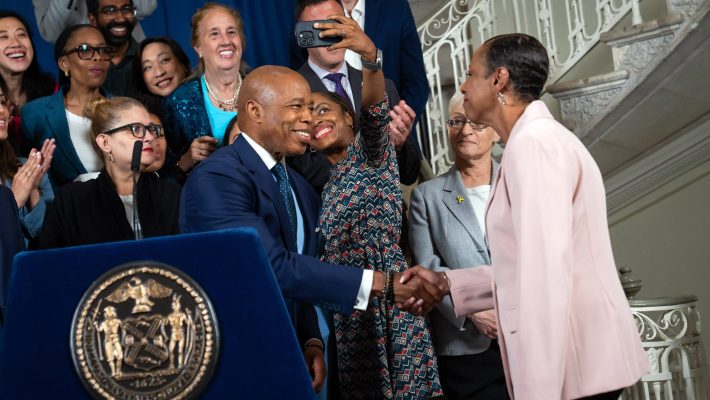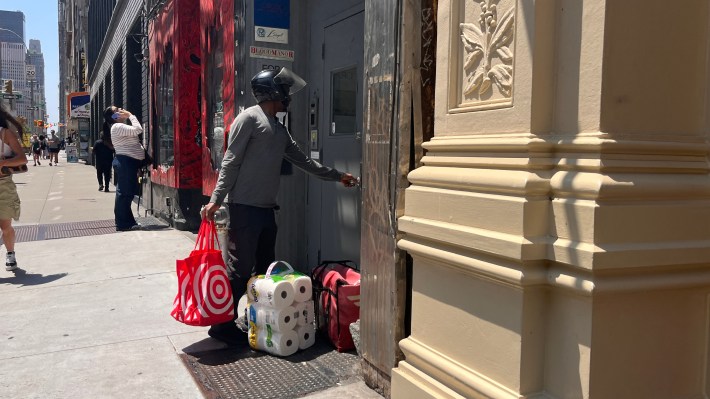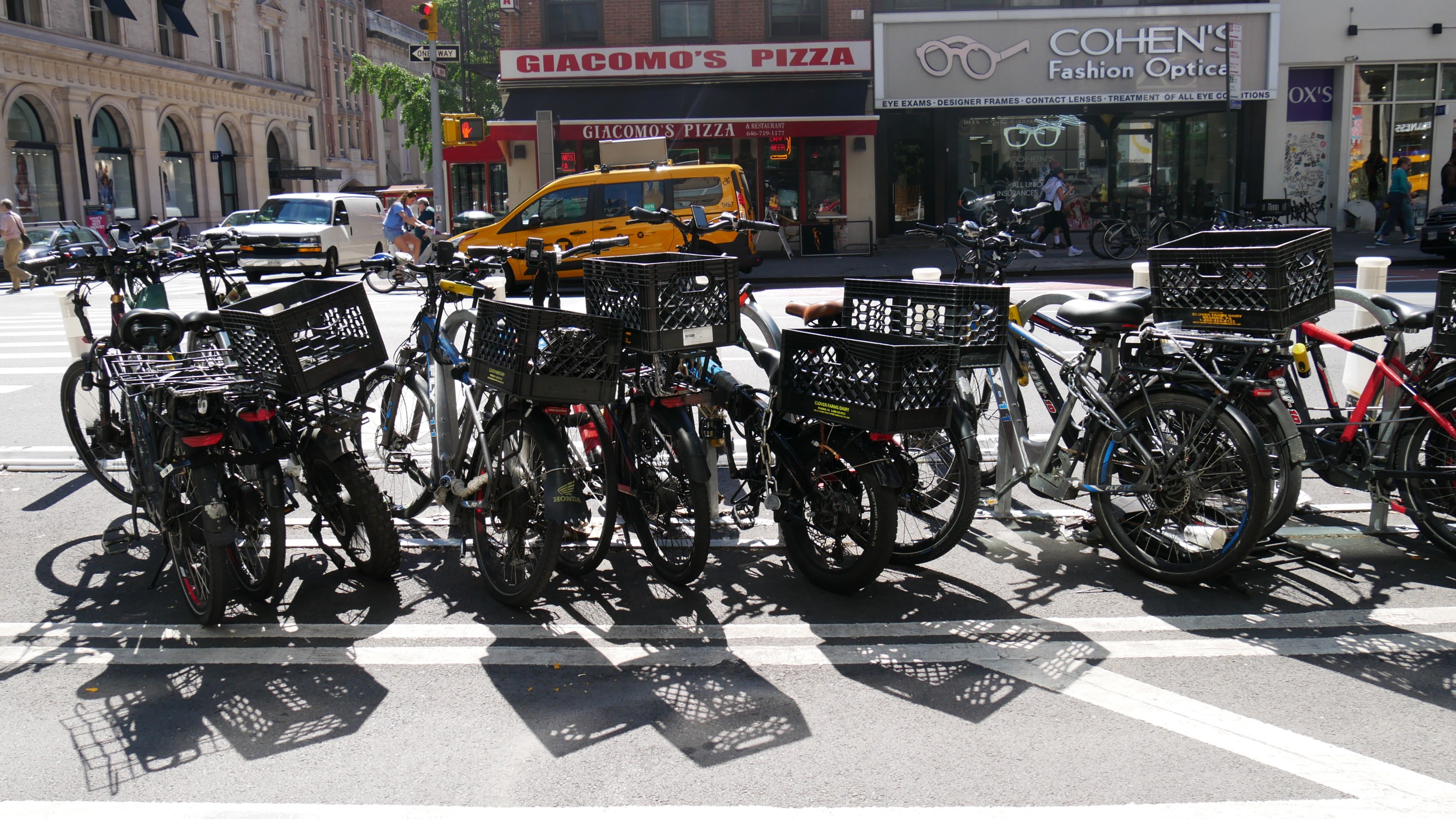App delivery companies will be required to provide safety equipment to workers, register them, and require them to take a Department of Transportation-led safety course under a Council bill that is set to pass this week despite fierce lobbying from the billion-dollar app industry.
The bill, Intro 20, has been in the works for two years and is expected to be approved on Sept. 10, its sponsor, Council Member Gale Brewer (D–Upper West Side), told Streetsblog.
The city already has such rules for couriers that work directly for restaurants, but Brewer's bill expands them to include the app companies, like Uber Eats, Grub Hub and DoorDash.
Streetsblog obtained the most-recent version of the bill, which stipulates that the companies would have to create a roster of workers, assign each worker an identification number, provide the workers with ID cards that contain their name, photo, and which company they work for, provide workers with reflective vests and other safety equipment and facilitate a safety course for each worker that will include latest "best practices" for e-bike operation and lithium-ion battery storage.
The new version has been modified to loosen the penalties on the app companies. Instead of penalizing app companies if workers fail to wear their reflective vest or carry their ID cards, the companies will only be penalized if they fail to provide these things to their workers.
At least one app company is happy with this change. Uber spokesperson Josh Gold told Streetsblog the changes were "positive," though he argues that the bill will push deliveristas to use mopeds instead of e-bikes. (Others, however, have pointed out that pushing delivery workers to mopeds has a potential safety ramification for pedal cyclists and pedestrians: operators of mopeds are required to have a driver's license and registration, cannot operate in bike lanes, and can be caught by automated enforcement cameras.)
Brewer is happy to be getting the bill over the finish line after a hard battle with the app companies, who fought the bill at every turn, she said.
"I don’t know what’s left for them," said Brewer of continued opposition from the corporations. “They were complaining about everything, it was a long list.”
And it's true, the companies have been sounding the alarms to the press for weeks about Brewer’s bill, sending out releases claiming it would hurt immigrants and that the penalties would drive them out of business.
But the bill has the support of immigrant and delivery worker advocates.
"This bill is written because the Department of Consumer and Worker Protection doesn’t have anything as a stick on these apps. We’ve been supported by the deliveristas, we’ve been supported by the immigration groups, and by the agency," said Brewer.
Overlapping priorities

On July 28, Mayor Adams announced that under the Department of Transportation’s new sub-agency, the Department of Sustainable Delivery, the city would change existing rules to bring app companies into compliance in the manner proposed under Brewer’s bill, which was introduced in January 2024.
The main difference between the Department of Sustainable Delivery's proposed rule change and Brewer's bill is the enforcement aspect. The Council's effort would allow the city to bar app companies if they do not comply, while the city rule change outlines a fine structure. To Brewer, the enforcement is one of the most important parts of the legislation.
"I think it’s the first bill that is putting some stick on the apps – they make billions," she said.
The DOT is supportive of Brewer's legislation and of this increased enforcement, a spokesperson said.
The overlapping proposals are just the latest example of the Council and the administration both trying to regulate the delivery app industry while fighting with each other about how to do it, and who gets credit for it.
Council Speaker Adrienne Adams, a critic of Mayor Adams (no relation), failed to support the mayor’s larger Department of Sustainable Delivery initiative and has, instead, been passing individual bills that advance what the mayor once said were his objectives.
The mayor recently vetoed a bill that would create pay parity in the delivery industry by expanding the minimum wage law to include grocery delivery companies like Instacart, despite the fact that his own administration released a report that promised to do just that.
Some New Yorkers who submitted public comments on the city’s proposed rule change supported the change, some wanted the city to do even more, and others complained about reckless Citi Bike riders, who are not covered by the rule change.
Relay and GrubHub, both owned by parent company Wonder Group, called the rule “unworkable” for their business models, saying that workers often use multiple apps and that the rule would require the companies to disclose sensitive information to the DOT.
The DOT argues that the information it is asking for is already collected by the apps and is necessary to enforce the rules and make sure the companies are providing what is required to the workforce, a representative for the agency told Streetsblog.
Immigration concerns
The rule on which the bill is drawn requires businesses hiring delivery workers on bikes (but not mopeds) to assign each operator an identification number, issue the workers photo ID cards with that number, and maintain a roster of all its workers and their personal information that can be accessed by any “authorized employee of the police department or department of transportation or any other person authorized by law.”

Delivery worker advocates as well as the app companies don't support this kind of change. Los Deliveristas Unidos was initially against the administration's rule change proposal on the grounds that it would bring more scrutiny on delivery workers.
“There's a focus on targeting and enforcing on individual workers that we think is burdensome,” said Gabriel Montero, the communications director for Los Deliveristas Unidos – which is part of the Worker’s Justice Project. "Why is there this need for excessive scrutiny and surveillance on these workers?”
But the organization’s Executive Director Ligia Guallpa told the news outlet The City last week that she supports Brewer's bill’s premise anyways because it would force the app companies to take responsibility for providing safety equipment.






